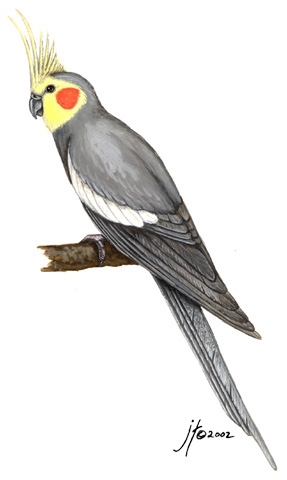Understanding Cockatiel Sleeping Patterns
Getting the lowdown on cockatiel sleep habits is key to their happiness and health. Let’s explore how much shut-eye they need, alongside the earthly things that could mess with their slumber.
Cockatiel Sleep Duration
Your average cockatiel typically snoozes for about 10 to 12 hours each night. A serene, dark setting is the recipe for a good night’s rest. The sleep hours can fluctuate based on factors like the ones in the handy table below:
| Season | Average Sleep Duration | What’s Up? |
|---|---|---|
| Winter | 12 hours | Shorter days mean more sleep |
| Summer | 8-10 hours | Loads of daylight shortens sleep time |
| Hormonal Control | Up to 14 hours | Helps manage lady bird hormones |
These birds might also sneak in 2-3 lengthy naps during the day, totaling up to about 16-18 hours of well-deserved rest if all goes well. Keeping them properly rested is vital so they can stay cheerful and full of beans.
Factors Affecting Cockatiel Sleep
A few things can throw off a cockatiel’s Zs:
-
Light Exposure: Natural light messes with sleep—for real. Fewer daylight hours in winter can lead to longer naps, while extra sunlight in summer may cut back sleep time. If necessary, curtains can help in faking a nice sleeping atmosphere.
-
Noise Levels: They have a dislike for racket. Quiet is a must for their bedtime; anything too loud or sudden can jolt them awake and spike their stress levels.
-
Cage Setup: A cozy cage makes a comfy nest. Ensure their crib is equipped with snug perches and parked in a chill part of the house.
Want more tips on making a dreamy sleep spot? Check out our article on providing comfort for sleep.
Nail these aspects for improved snooze quality and overall wellness. For the full lowdown on keeping cockatiels happy and healthy, head over to our detailed guide on cockatiel care.
Creating an Ideal Sleep Environment
Giving your cockatiel the perfect snooze zone is super important for keeping it chirpy and healthy. The vibe in their space, like how warm or cool it is, the lighting, and how comfy it feels, all add up to a good night’s sleep.
Temperature and Lighting
Cockatiels like it between 65°F and 80°F — it’s their sweet spot. Make sure to dodge any cold drafts and rapid temperature swings. Those air conditioners or spots where other pets might roam (we’re looking at you, cats and dogs) should be no-go zones for their cage (PetMD).
To get the sleep area just right:
- Keep it cozy: Aim for about 76-77°F for a toasty and comfy feel (Quora).
- Good shut-eye: They need a solid 10-12 hours of snooze time to stay healthy.
- Light it right: Slowly dim the lights as bedtime approaches, mimicking the setting sun.
- Cage cover-up: Throw a breathable cover over three sides of the cage, making it dark and snug for them.
Providing Comfort for Sleep
Making sure your cockatiel feels safe and comfy is a game changer for its sleep game. Here’s how you can step up their sleep setup:
- Quiet zone: Stick the cage in a peaceful corner away from noisy spots and shuffling feet.
- Perch variety: Mix up the perch sizes to keep those little feet happy and rested.
- Sparkling clean crib: Give their pad a good clean with fresh bedding and substrata weekly.
- Clean water always: Fresh, clean water needs to be within reach at all times, with dish cleaning happening daily (PetMD).
Nailing the temperature, lighting, and overall comfy vibe for your cockatiel’s crib can really boost its sleep health. Want more tips on cockatiel care? Hit up our complete cockatiel care guide.
Monitoring Cockatiel’s Sleep Habits
Keeping tabs on your cockatiel’s sleep routine is key to making sure they’re healthy and happy. Knowing the difference between what’s normal and what’s not can help you spot any sneaky health issues before they turn into serious problems.
Normal vs. Abnormal Sleep Patterns
Cockatiels doze off for about 10 to 12 hours each night. They love a peaceful, dark nook to catch their Z’s. In the chill of winter, they might hit the snooze button longer, up to 12 hours, and during those sunny summer days, they may nap for around 8 to 10 hours. Some of these birds may even need a full 14 hours of downtime to keep certain hormonal vibes in check.
| Season | Typical Sleep Duration (hours) |
|---|---|
| Winter | 10-12 |
| Summer | 8-10 |
| Hormonal Control | Up to 14 |
Throughout the day, you’ll see cockatiels buzzing with energy, especially in the morning and afternoon, with a couple of lengthy naps sprinkled in between. Altogether, they may accumulate about 16-18 hours of rest per day. But if your cockatiel’s clocking more like 20 hours of shut-eye, it could hint at health bumps like a cold, flu, or even liver troubles.
When to Seek Veterinary Care
Keep a sharp eye out for any sudden shifts in how your cockatiel catches its winks. If it’s catching extra-long z’s without the usual breaks for munching, sipping, or grooming, that’s your cue to act. Also, if your bird’s feathers are puffed out like it’s permanently chilly, or you notice other sick-bird behaviors, it’s time to ring up that avian vet.
Signs to Watch For:
- Sleeps too much (>20 hours a day)
- No bursts of pep
- Puffed up feathers
- Avoids eating or drinking
Jumping into action and getting your feathered buddy checked out ASAP can nip any potential health woes in the bud. Regular vet check-ups by someone who knows the ins and outs of cockatiel care are a must for keeping your bird in top shape.
By keeping an eye on your cockatiel’s napping habits and sorting out what’s normal from what’s not, you can make sure your birdie is living its best life. For extra tips, check out our handy guides on setting up your cockatiel’s cage and keeping their diet just right for tip-top-conditions.

